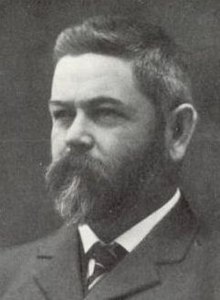Francis Clarke
| Francis Clarke | |
|---|---|
 |
|
| Member of the Australian Parliament for Cowper |
|
|
In office 29 March 1901 – 16 December 1903 |
|
| Preceded by | New seat |
| Succeeded by | Henry Lee |
| Personal details | |
| Born |
25 March 1857 Stroud, New South Wales |
| Died | 18 May 1939 (aged 82) |
| Nationality | Australian |
| Political party | Protectionist Party |
| Occupation | Surveyor |
Francis Clarke (25 March 1857 – 18 May 1939) was an Australian politician. Born in Stroud, New South Wales, the son of Thomas Clarke and Ellen Walsh. He attended St Stanislaus' College at Bathurst before becoming a surveyor. He was a member of the New South Wales Legislative Assembly from 1893 to 1898, representing the seats of Macleay and Hastings and the Macleay. He was a member of the New South Wales Legislative Council from 1899–1900, representing the Protectionist Party. In 1901, he was elected to the Australian House of Representatives as the Protectionist member for Cowper. He held the seat until his defeat in 1903 by Henry Lee of the Free Trade Party. He had also served as the mayor of North Sydney in the late 1890s. He died in 1939.
He is best noted for his role in expediting the re-inclusion of Edmund Barton in the Australasian Federal Convention for the establishment of the Australian Federation. Barton was a major driver in the Federation movement but as he lost his seat in the NSW Colonial parliament he faced exclusion from the discussions. To expedite his return to the political process Francis Clarke resigned from his safe seat of Hastings and the Macleay triggering a by-election which Barton won with Clarke's endorsement.
After leaving politics he was drafted as a member of the Royal Commission on Customs and Tariff 1904-07 and the Royal Commission on Northern Territory railways and ports (1913–1914). He had been a pioneer of surveying this hitherto undeveloped part of the Australian continent.
...
Wikipedia
